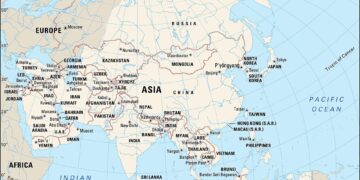The Ongoing Struggle in Yemen: A Closer Look at U.S. and Israeli Involvement
Introduction
The conflict in Yemen, which has been tumultuous for years, continues to draw international attention, particularly regarding the roles of the United States and Israel. Despite their efforts to influence outcomes on various fronts, both nations are facing significant challenges that raise questions about their strategies and effectiveness.
Unraveling the Conflict in Yemen
Yemen has descended into chaos since 2015 when a civil war erupted between Houthi rebels and the internationally recognized Yemeni government. This turmoil has drawn external actors into the fray. Iran’s support for the Houthis contrasts sharply with Saudi Arabia’s backing of the Yemeni government, thereby complicating an already intricate situation.
U.S. Strategy: A Shifting Approach
Historically, U.S. involvement has been multifaceted—ranging from military support to counterterrorism operations against groups like Al-Qaeda in the Arabian Peninsula (AQAP). However, recent trends indicate a reevaluation of tactics due to mounting public concern over civilian casualties and humanitarian issues caused by prolonged conflict.
Current Losses vs Gains
Despite substantial financial investments and arms sales aimed at bolstering Saudi forces against Houthi aggression, reports suggest that these efforts have not yielded decisive victories on ground conditions. The stalemate emphasizes a growing disillusionment surrounding military interventions as they fail to produce favorable results.
Israeli Interests: A Complicated Dynamic
Israel’s objectives in Yemen primarily align with its broader regional ambitions—containing Iranian influence while fostering closer ties with Gulf states wary of Tehran’s actions. Nevertheless, Israel’s subtle interventions reflect more on strategic positioning rather than direct engagement or overt militaristic involvement.
Geopolitical Consequences
The intricacies of Israeli policies can inadvertently entangle them within complex alliances that evolve rapidly amidst shifting allegiances among Middle Eastern nations. This volatile environment poses risks for any long-term strategic goals Israel may aspire toward regarding regional stability.
Humanitarian Crisis: An Overlooked Reality
Amidst this geopolitical tug-of-war lies one of the world’s worst humanitarian crises; millions suffer from famine exacerbated by blockades and ongoing violence. Only recently did awareness increase around these dire circumstances; statistics reveal that approximately 24 million people—roughly 80% of Yemen’s population—are now reliant on some form of aid.
International Response
With global attention focused largely on power struggles between nations such as Iran vs Saudi Arabia or esoteric debates about nuclear negotiations, there is a pressing need for concerted international action aimed at alleviating human suffering resulting from conflicts propagated by foreign powers’ interests in domestic affairs.
Conclusion: Reevaluating Involvement Strategies
As external players like the U.S. and Israel navigate their roles within this complicated tapestry comprising both political machinations & humanitarian needs—the question remains whether their strategies will adapt adequately toward finding resolutions rather than prolonging hostilities or misplacing priorities amid intensifying crises affecting ordinary citizens caught up unwittingly within larger global confrontations.















